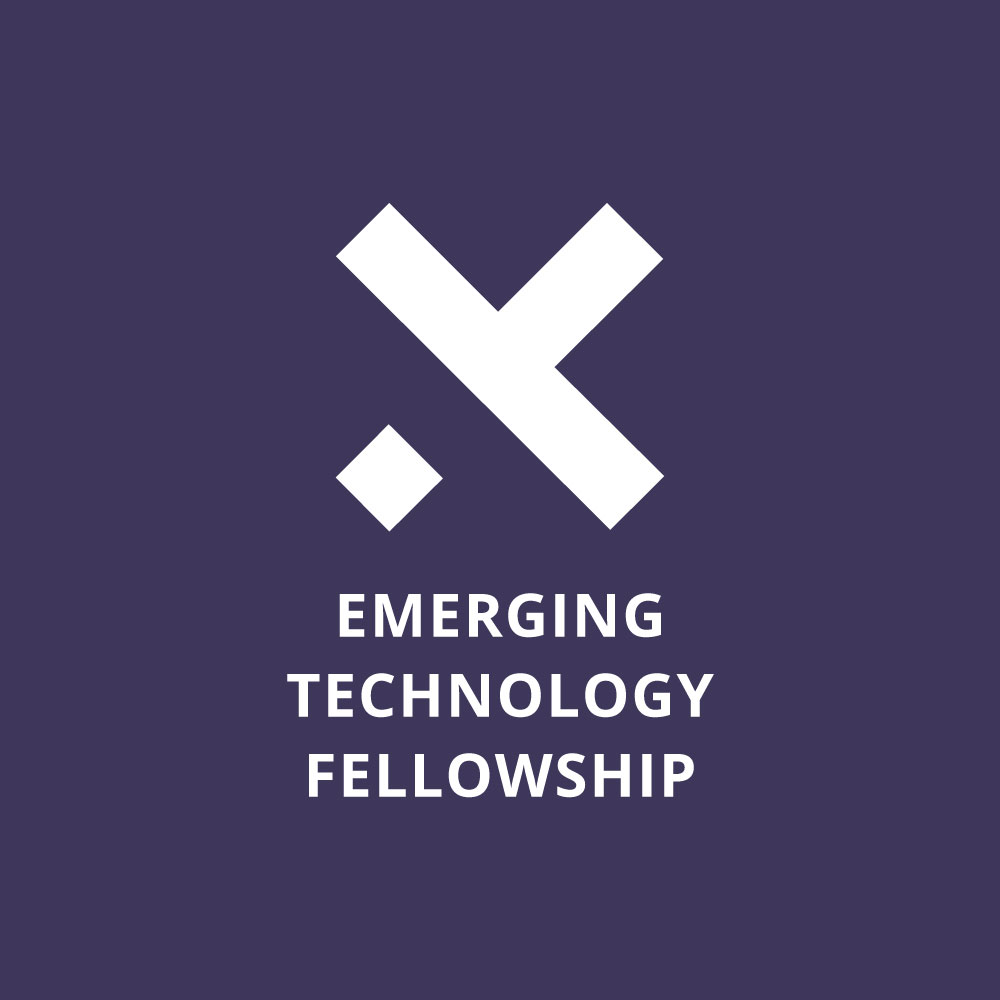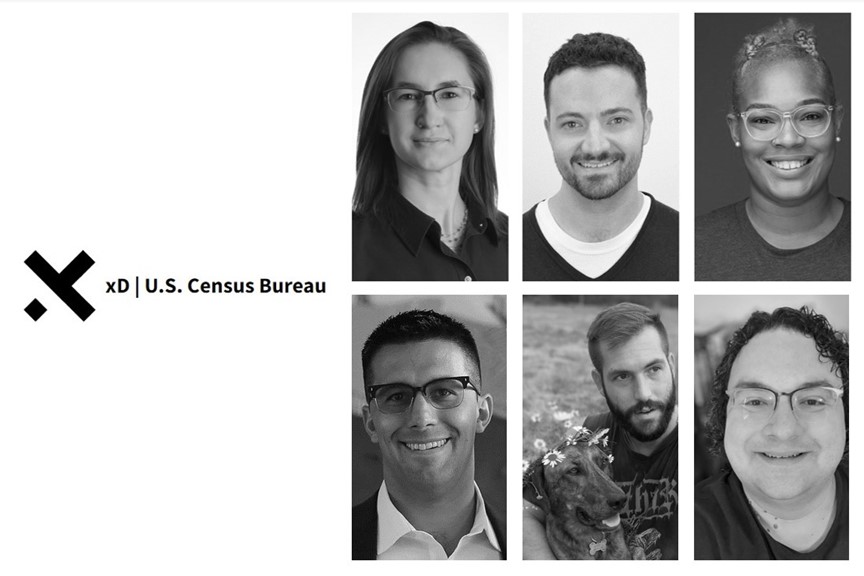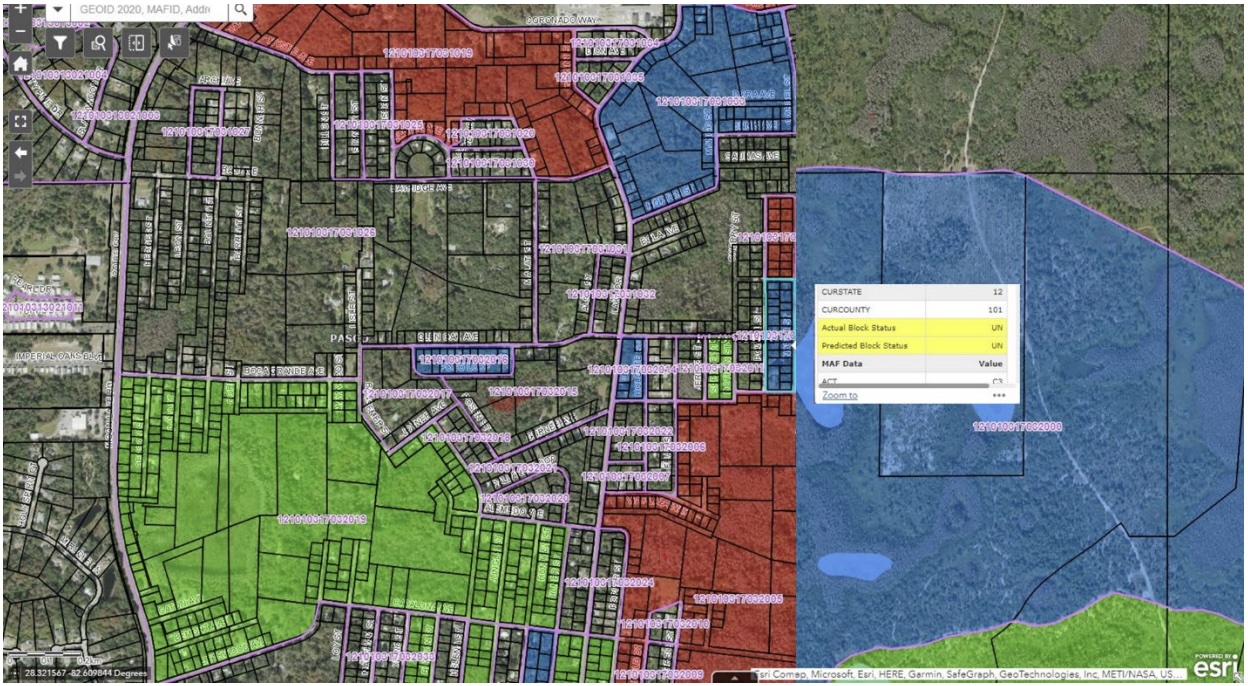Announcing the 2024 xD Emerging Technology Fellows
July 30, 2024
Join us in welcoming the five newest members of the xD team's Emerging Technology Fellowship (ETF)!
These visionary technologists and innovators bring highly sought-after expertise to the Census Bureau in artificial intelligence (AI), machine learning, data science, data engineering, and project management with specializations in data architecture, algorithmic transparency, algorithmic bias mitigation, privacy enhancing technologies and human-computer interaction.
“We're very excited to welcome this new group of colleagues that will bring additional expertise and new ideas to improve how the Census Bureau works with other government partners and the public!" - Curtis Mitchell, 2023 ETF
The Emerging Tech Fellowship is a key component of xD’s mission to advance the delivery of data-driven services through new and transformative technologies. The 2024 cohort will join our existing 2023 fellows to work on mission-critical technology challenges at the Census Bureau with the Decennial Information Technology Division, Enhancing Health Data Programs, Economics Directorate, Research & Methodology Directorate, and the Deputy Director’s Office as well as other partner agencies such as the National Institute of Standards and Technology, and the General Services Administration.
“Each cohort of Emerging Technology Fellows is an opportunity to bring new and diverse perspectives and talents to the Bureau's mission and government more broadly. I couldn't be more excited to welcome this group and see all that they'll do for the public good.” - Kate McCall-Kiley, xD Lead
If you’d like to learn more about this year’s projects or discuss future projects, you can reach the team xD at inquiries@xd.gov. To learn more about xD and the Emerging Technology Fellowship, please visit https://www.xd.gov/apply.
Meet the 2024 Emerging Technology Fellows:

Amari Cowan (she/her) comes to xD with 7 years of experience working in emerging technologies and public policy. Amari most recently supported the U.S. Federal Energy Regulatory Commission as an AI Trust Officer, a consultant role meant to address 2024 federal AI policy priorities. She led the early development and design of FERC’s Responsible AI policy framework, while also assessing the maturity of FERC’s AI governance strategy. Prior to her role at FERC, Amari also served as the first NORAM Policy Performance Manager at TikTok, during which time her team worked to further improve and test TikTok’s content moderation system.
As an Associate Manager on Meta’s Governance team, Amari worked on a variety of global, cutting-edge tech governance projects including launching the Oversight Board — a first-of-its-kind independent content moderation decision-making body — researching community-led governance methods in the Metaverse in partnership with Stanford’s Digital Democracy Lab, and enhancing Meta’s elections-related policies during the U.S. 2020 Presidential Election in partnership with Harvard’s Social Science One. She concurrently serves as a Fellow at the Portulans Institute, where she researches novel AI governance frameworks and collaborates with public interest Responsible AI organizations.
Beyond her professional endeavors, Amari finds solace in exploring nature, often hiking and climbing in national and state parks.

Jess Stahl is excited to join the xD team as an Emerging Technology Fellow. Jess leads national initiatives on AI and privacy tech, often collaborating with non-profit, industry, philanthropic, and academic organizations. Jess has previously served as Vice President, Chief Data Officer, and has held multiple roles with companies building platforms to facilitate access to AI systems for evaluation, audit and research using privacy enhancing technologies (PETs). As an Emerging Technology Fellow, Jess looks forward contributing to federal AI initatives (e.g., ARIA, ARPA-H, National Secure Data Service, National AI Research Resource)</p> </div> Katie Johnson (she/her) is excited to join as an Emerging Technology Fellow with xD. She has worked in data-driven roles for 14 years, first in UX research and then data science and ML engineering. Katie is passionate about data and AI ethics and creating data-driven solutions for the public interest. Before the Census Bureau, Katie founded Mirror Labs, a venture dedicated to fostering empathy through machine learning and text-to-music translation, which earned recognition in Microsoft's Startup Accelerator Program. Prior to that, at Recurve Analytics, she led Market Access reporting for the California Public Utilities Commission and developed pipelines for a pioneering study on heat pump installations for grid electrification. Katie holds a B.A. in Environmental Science from Mills College and a Certificate in Data Science from Galvanize. Based in Seattle, she lives with her partner and adorable dog, Adi. As part of the xD fellowship, Katie is interested in AI governance, responsible AI and expanding avenues for impact through data. Richard Martinez (he/him) is a Human-Computer Interaction researcher specializing in Community-Based Participatory Design (CBPD) and Design-Based Implementation Research (DBIR) methodologies. His work focuses on integrating HCI approaches with community collaboration to develop and promote equitable emerging technologies. Richard has partnered with companies such as Google, Meta, Snapchat, and Polygon Technologies to explore the socio-technical implications of emerging technologies like blockchain, AI, and mixed reality. He is dedicated to addressing challenges in social computing, education, and human-AI interactions to build fair, accountable, transparent, and ethical technologies. Wesley Pasfield is thrilled to join the xD team as an Emerging Technology Fellow. With 13 years of experience in Data Science, Analytics, and Machine Learning, Wesley has worked across various industries, including healthcare, consumer electronics, consumer packaged goods, gaming, and advertising. For the past 2.5 years, he served as the Head of Data Science for Lark Health, a telehealth company that helps users manage and prevent chronic conditions. Prior to Lark, Wesley spent over 5 years at Amazon & AWS, holding positions such as Data Scientist at Twitch, Senior Data Scientist in the Machine Learning Specialty Practice of AWS Professional Services, and Senior Data Scientist at Amazon Advertising. Before his time at Amazon, Wesley worked as a Data Scientist for GoPro, focusing on User Analytics, and at the Nielsen Company as a statistical modeler, evaluating the impact of marketing on product sales for CPG companies. Wesley holds an MS in Predictive Analytics from Northwestern University and a BS in Management from Boston College. He also serves as an adjunct professor in the University of San Diego's Applied Artificial Intelligence and Applied Data Science programs. Based in the Denver metro area, Wesley lives with his wife and daughter. In this fellowship, Wesley is particularly interested in AI policy pertaining to large language models, notably regulations on data and evaluation, as well as the Census 2030 project.






